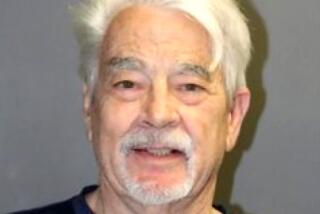Therapist Loses License Over Affair With Patient : Ventura: Jerome Evans’ lawyer argues that the revocation is unwarranted because the professional relationship ended before the sexual relationship started.
- Share via
A Ventura psychologist who had a 10-month affair with a woman he was treating for chronic depression had his license revoked Monday by the state Board of Psychology.
Jerome R. Evans, a psychologist since 1971 who also worked in the family care clinic at Ventura County Medical Center, was barred from continuing his practice after having sex with a woman he had treated dozens of times over several years.
Evans, a frequent expert witness in court proceedings, did not return calls seeking comment Monday.
But his attorney said the revocation is unwarranted because Evans, 53, ceased the professional relationship before the weekend the two spent at a San Francisco hotel in 1987.
“It was a former patient. It wasn’t a patient,” said Oxnard attorney Richard A. Regnier, who represents Evans. “That’s the whole difference, and it’s a critical difference.
“It’s something that we’ll have to take up later (in court), and the record will support us,” said Regnier, who argued at one point that the affair was not improper because Evans was treating the woman for “vocational counseling” and not providing psychological therapy.
Regnier said he expected to appeal the ruling to a Ventura County Superior Court judge within weeks.
But the executive director of the Board of Psychology said it is improper for a therapist ever to have an affair with a client--even if the professional relationship has ended.
“The psychotherapy is totally dependent on trust,” said Tom O’Connor. “If that trust is broken, there’s a lot of harm that’s going to happen to that patient.”
Revocation of a therapist’s license is the appropriate penalty, in part because the woman required hospitalization and further psychological treatment as a result of the affair, O’Connor said.
“All the research shows that sexually abusing patients can result in loss of self-esteem, depression and there even have been some cases of suicide,” he said.
Evans began the affair during a three-day weekend in San Francisco in early September, 1987--days after he and the woman kissed in his office, according to the complaint.
By mid-September, Evans had referred the woman to another therapist, who advised Evans to cease the sexual relationship. After several meetings with the woman’s new therapist, Evans agreed to end the relationship in June, 1988, the medical board said.
Evans notified the state about his affair with the woman, who has remained unidentified for purposes of the hearings, after he agreed to settle a civil claim regarding the affair, according to documents on file with the Board of Psychology.
The therapist agreed in 1988 to pay $30,000 to settle a civil complaint lodged by the woman, who was divorced by her husband after he found out about the affair, according to medical board documents. Evans’ insurance company agreed to pay another $25,000 under the same agreement, the documents said.
After a series of hearings conducted in February and March, 1993, an administrative law judge determined that Evans was guilty of impropriety and should be disciplined.
Judge David R. Rosenman recommended that the Board of Psychology suspend Evans’ license for 120 days and place him on probation for five years.
But after further arguments held in Long Beach last month--oral arguments during which Evans and his attorney were present--the board decided unanimously to revoke Evans’ license.
“The focus of these proceedings is not to punish the licensee, the focus is to protect the safety of the public,” said Deputy Atty. Gen. Elisa B. Wolfe, who prosecuted Evans.
“The board evidently found the probation’s terms and conditions were not sufficient to protect the public,” she said.
Although Regnier said the consensual sex was not improper because the doctor-patient relationship had ended, others disagree.
“It’s basically a ‘never’ rule,” said Thomas Nagy, a Palo Alto psychologist who spent six years on an ethics committee of the California Psychological Assn. “Ninety-nine percent of the time, the therapist terminates the relationship, and the potential for adverse results are huge.”
More to Read
Sign up for Essential California
The most important California stories and recommendations in your inbox every morning.
You may occasionally receive promotional content from the Los Angeles Times.













